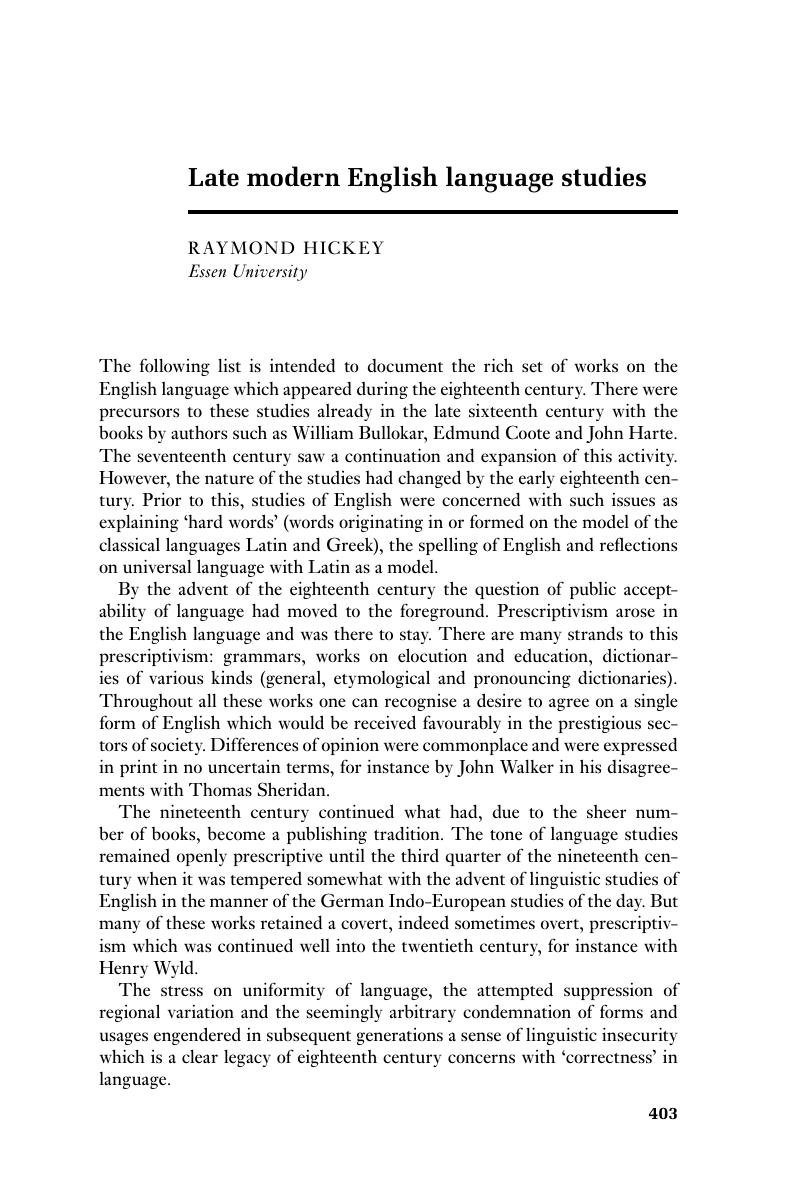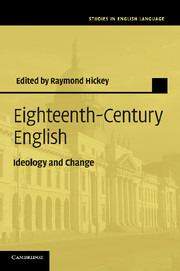Book contents
- Frontmatter
- Contents
- List of figures
- List of maps
- List of tables
- Notes on contributors
- Preface
- 1 Attitudes and concerns in eighteenth-century English
- 2 Prescriptivism and the suppression of variation
- 3 Women's grammars
- 4 Eighteenth-century women and their norms of correctness
- 5 Lowth as an icon of prescriptivism
- 6 Queeney Thrale and the teaching of English grammar
- 7 Coalitions, networks, and discourse communities in Augustan England: The Spectator and the early eighteenth-century essay
- 8 Contextualising eighteenth-century politeness: social distinction and metaphorical levelling
- 9 Expressive speech acts and politeness in eighteenth-century English
- 10 Variation and change in eighteenth-century English
- 11 Variation in sentential complements in eighteenth- and nineteenth-century English: a processing-based explanation
- 12 Nationality and standardisation in eighteenth-century Scotland
- 13 English in eighteenth-century Ireland
- 14 Changes and continuities in dialect grammar
- 15 ‘Be pleased to report expressly’: the development of a public style in Late Modern English business and official correspondence
- 16 Registering the language – dictionaries, diction and the art of elocution
- Timeline for the eighteenth century
- References
- Late modern English language studies
- Indexes
- References
Late modern English language studies
Published online by Cambridge University Press: 06 December 2010
- Frontmatter
- Contents
- List of figures
- List of maps
- List of tables
- Notes on contributors
- Preface
- 1 Attitudes and concerns in eighteenth-century English
- 2 Prescriptivism and the suppression of variation
- 3 Women's grammars
- 4 Eighteenth-century women and their norms of correctness
- 5 Lowth as an icon of prescriptivism
- 6 Queeney Thrale and the teaching of English grammar
- 7 Coalitions, networks, and discourse communities in Augustan England: The Spectator and the early eighteenth-century essay
- 8 Contextualising eighteenth-century politeness: social distinction and metaphorical levelling
- 9 Expressive speech acts and politeness in eighteenth-century English
- 10 Variation and change in eighteenth-century English
- 11 Variation in sentential complements in eighteenth- and nineteenth-century English: a processing-based explanation
- 12 Nationality and standardisation in eighteenth-century Scotland
- 13 English in eighteenth-century Ireland
- 14 Changes and continuities in dialect grammar
- 15 ‘Be pleased to report expressly’: the development of a public style in Late Modern English business and official correspondence
- 16 Registering the language – dictionaries, diction and the art of elocution
- Timeline for the eighteenth century
- References
- Late modern English language studies
- Indexes
- References
Summary

- Type
- Chapter
- Information
- Eighteenth-Century EnglishIdeology and Change, pp. 403 - 413Publisher: Cambridge University PressPrint publication year: 2010
References
- 1
- Cited by



